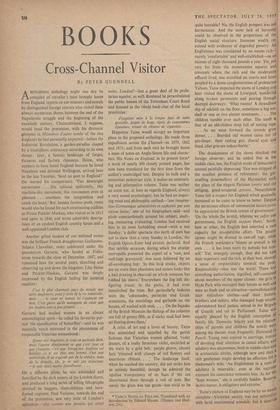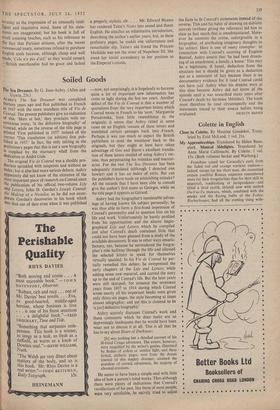BOOKS
Cross-Channel Visitor
By PETER QUENNELL AREWARDING anthology might one day be compiled of traveller's tales brought home from England, reports on our manners and morals by distinguished foreign tourists who visited these always mysterious shores between the end of the Napoleonic struggle and the beginning of the twentieth century. Chateaubriand, I suppose, would head the procession, with his dramatic limpses in Memoires d'outre tombe of the two Englands he had personally inspected—before the Industrial Revolution, a garden-paradise shaped br a triumPhant aristocracy according to its own design : later, a Satanic landscape of forges, furnaces and factory chimneys. Heine, who appears to have hated England because he loved Napoleon and detested Wellington, arrived here in the late Twenties. 'Send no poet to England!' (he warned his compatriots). 'This downright earnestness . . . this colossal uniformity, this machine-like movement, this moroseness even in pleasure . . . smothers the imagination and rends the heart.' But, besides famous poets, room would also be found for such entertaining oddities as Prince Ptickler-Muskau, who visited us in 1814 and again in 1846, and wrote admirable descrip- tions of an opulent English country house and a well-appointed London club.
Another gifted student of our national mores was the brilliant French draughtsman Guillaume- Sulpicc Chevallier, more celebrated under the pseudonym Gavarni, who landed at Folke- stone towards the close of December, 1847, and remained here for several years, sketching and observing up and down the kingdom. Like Heine and Piickler-Muskau, Gavarni was deeply impressed by the English feeling for material comfort :
C'est le plus charmant pays du tnonde (we cote Angleterre, pour y vivre de la vie matdrielle, mais . . . le coeur ne mural: id i s'appuyer stir rien. C'est parce qu'ils man quent de cteur que les Anglais SO/ti si pea gettants. . . .
Gavarni had studied women in an almost entomological spirit—he called his favourite pur- suit 'the classification of butterflies'—and he was naturally much interested in the phenomena of respectable Victorian womanhood: Quant aus Anglaises, je votts en parlerais bien, nuns j' ignore absolument cc que c'est: tout cc que Finn:gine, c'est tine, lorsqu'une Anglaise est habilee, cc n' est plus une femme, c'est une cat hedrale. 11 tie s'agirait pas de la sednire, mais de la dentolir. Or, je ne sins pas seducteur, —je suis attssi 11101115 demolisseur. . . .
On a different plane, he was astounded and horrified by the dark misery of the London slums, and produced a long series of telling lithographs devoted to beggars, slum-children and bare- footed vagrants. Paul Verlaine, towards the end of the procession, saw. very little of London's splendour—'p/al comme une punaise qui serait noire, London!'—but a great deal of its prole- tarian squalor, as with Rimbaud he perambulated the public houses of the Tottenham Court Road and listened to the ribald back-chat of the local prostitutes : d'exquises miss a la longue jape de satin
groseille, jaspee de bone, tigree de consontmes epandues, trouee de chittres de cigarettes. . . .
Hippolyte Taine would occupy an important place in the proposed anthology. He made three expeditions across the Channel—in 1859, 1862 and 1871; and from each visit he brought home a mass of notes on Anglo-Saxon life and charac- ters. His Notes on England, in its present form* a work of nearly 300 closely printed pages, has now been translated for the first time from the author's unabridged text. Despite its bulk and a somewhat pedestrian style, it makes an entertain- ing and informative volume. Taine was neither an artist nor, at least as regards England, always a very sound psychologist; but he had an inquir- ing mind and philosophic outlook—'une imagina- tion Gertnanique administree et exploitee par une raison latine,' one of his biographers said—and plods conscientiously around his subject, study- ing, measuring, evaluating. London had received him in its most forbidding mood—with a wet Sunday; 'a duller spectacle this earth of ours has not to show than a rainy Sunday in London,' the English Opium-Eater had already declared. And that terrible occasion, during which the strange metropolis presented the aspect of a 'vast, and well-kept graveyard,' was soon followed by an all-enveloping fog : 'In this livid smoke, objects are no more than phantoms and nature looks like a bad drawing in charcoal on which someone has rubbed his sleeve.' Everywhere the fog left dis- figuring traces; in the parks, it had even besmirched the trees. But particularly hideous were the 'colonnades, peristyles .and Greek ornaments, the mouldings and garlands on the houses, all washed with soot. . . . On the facades of the British Museum the flutings of the columns are full of greasy filth, as if sticky mud had been set flowing down them.'
A critic of art and a lover of beauty, Taine was astonished and appalled by the garish fashions that Victorian women affected, 'violet dresses, of a really ferocious violet, encircled at the waist by a gold belt,' purple gloves, absurd hats 'trimmed with clumps of red flowers and enormous ribbons. . . .' The landscape itself, when he reached the country, did not strike him as entirely beautiful, though he admired the opaline transparency of its hues if the sun illuminated them through a veil of mist. But surely the grass was too green—too vivid to be TAINCS NOUS ON ENOI AND. Translated with an introduction by Edward Hyams. (Thames and Hud- son, 25s.) quite bearable? No, the English prospect was not harmonious. And the same lack of harmony could be observed in the proportions of the English social structure. Immense wealth co- existed with evidences of degraded poverty. An Englishman was considered by no means rich— merely 'comfortable' and well-established—on an income of eight thousand pounds a year. Yet, not very far from the monotonous squares and crescents where the rich and the moderately affluent lived, one stumbled on courts and lanes peopled by a dense conglomeration of proletarian Yahoos. Taine inspected the slums of London and later visited the slums of Liverpool, wandering along broken pavements and peering through decrepit doorways : 'What rooms! A threadbare slip of oilcloth on the floor, sometimes a big sea- shell or one or two plaster ornaments. . . . The children tumble over each other. The smell is that of an old-clothes shop full of rotting rags. . . . As we went forward the crowds greW denser. . . . Bearded old women came out of gin-shops: their reeling gait, dismal eyes and fixed, idiot grin are indescribable.'
The drunkenness of the slums shocked the foreign observer; and he added that in the middle class, too, the English mode of debauchery seemed painfully depressi.ng. Vice was stripped of the smallest pretence of refinement : the gin smelling streetwalkers of the Haymarket took the place of the elegant Parisian lorette and the obliging, good-tempered grisette. Nevertheless, Taine felt a respect for England which gradually increased as he came to know us better. Despite the pernicious effects of commercial laissez-f he appreciated the British system of government: 'On the whole [he wrote], whereas we suffer our government, the English support theirs.' Sonw how or other, the English had inherited a rare capacity for co-operative effort. The poorer classes might be dressed in cast-off rags; while the French workman's 'blouse or overall is Ins own . . . it has been worn by nobody but hilly self.' Yet, strangely enough, they did not hate their superiors; and the rich, at their best, showed a sense of responsibility towards the poor, Responsibility—that was the word! There was something authoritative, dignified, self-contained about members of the upper classes: the girls In Hyde Park who managed their horses so well and were so fresh and so attractive—notwithstanding their ridiculous clothes—and their fathers, brothers and suitors, who Managed huge estates, administered local justice, served in the Brigade of Guards and sat in Parliament. Tame was equally pleased by the English conception of ' family life. Domestic felicity and the relation' ships of parents and children (he noted) were among the themes most frequently illustrated in Punch. Young men aspired to marriage, instead of devoting their attention to casual affairs; and, adultery was uncommon, both in middle-class all in aristocratic circles, although now and then 3 rich gentleman might develop an affection for a, tradesman's wife. 'An Englishman in a state °I adultery is miserable : even at the suprenle moment his conscience torments him. As for the "kept woman," she is carefully hidden. Reserve, in this matter, is obligatory and extreme.'
Taine's picture of England may be by no mca.ns complete—Victorian society was not unfamiliar with lurid matriinoniai scandals; but it deserveS
scrutiny as the impression of an unusually intel- ligent and inquisitive mind. Some of his state- ments are exaggerated; but his book is full of small amusing touches, such as his reference to the fact that Parisian artisans, after the recent commercial treaty, sometimes refused to purchase English tools because, although cheap and well
made, 'Cela n'a pas as they would remark —British merchandise had no grace and lacked a properly stylistic air. . . . Mr. Edward Hyams has rendered Taine's Notes into sound and fluent English. He attaches an informative introduction, describing the author's earlier years; but, in these prefatory pages, he makes one unfortunate and remarkable slip. Taine's old friend the Princess Mathilde was not the sister of Napoleon III. She owed her social ascendancy to her position as the Emperor's cousin.































 Previous page
Previous page